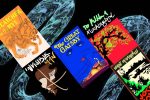Why Studying English and Writing Are Different
With many colleges now offering courses in technical writing, English is less about writing than ever before.
By Josephine Werni, University of Minnesota Twin Cities
Writers and English Majors are two groups of people that are invariably lumped together.
On the surface, this conclusion makes perfect sense. It is safe to assume that individuals who dig writing would find fulfillment in studying written work. However, this isn’t always the case, and not every impassioned wordsmith is cut out to be an English major.
Like loads of other people, I picked English as a major initially because I knew I was better at writing than anything else and those two things just appeared to go together. The thing is, English degrees are composed of so much more than just the development of writing skills.

For example, if the English degree were a cheeseburger, the fluffy yet resilient sesame seed buns would represent writing competence. The ability to write adequately functions like the bun unit of a cheeseburger in that everything else just wouldn’t really work without it. Critically examining the historical and cultural themes of a text is going to be much less feasible if you have a tough time penning your ideas clearly.
The toppings and condiments of the English Burger would be composed of things like critical/creative thinking, research skills, an exquisite mastery of bullshitting, procrastination, caffeine addiction and cardigans.
Finally, the beef patty core of the English Burger would be the consumption and discussion of literature. If there’s an element on a sandwich that you find acutely un-tasty, it could easily prevent you from enjoying the whole thing. Unlike a sandwich though, you can’t just pick out parts of a degree and refuse to deal with them. You might just be better of picking something else.
It was a bright, soupy morning in June when I realized that while I’ve always adored writing and would consider it to be my principle academic skill, I really didn’t want to be an English major anymore. There were 20 or so of us students squeezed into a half-classroom for the summer edition of Analysis of British Literature. It was the second day of class. After a verbose lecture that I had been fruitlessly struggling to pay attention to, the professor announced that we would be released for a break.
“Before you go though, I’d like you to think about the poem we just read and why you think it was written in Petrarchan form as opposed to another form. We’ll be writing about and discussing this topic when you get back,” the professor added cheerfully before excusing us.
In that moment, something inside of me snapped. It dawned on me that I didn’t give a single flapping fuck about why the poem was written in Petrarchan form and that spending the next two hours pretending like I knew why was one of the last things on earth that I felt like doing.
In the heat of this epiphany, I skittered out of the classroom, down the stairs and out of the building with no intention of returning for the second half of class. I stopped by the bookstore to drop off the books that I had rented only days earlier and then hopped on the next bus home. Upon arrival, I hunkered down, dropped Brit Lit and feverishly began filling out the Journalism School application.
In truth, this particular concoction of apathy, anxiety and general distaste had been stewing with each literature analysis class I took as required by my English degree. I’d been repressing it, unwilling to admit my mistake or deal with the consequences of it for some time.
I think it’s important to make it clear here that I mean no disrespect to those who treasure classic literature and delight in dissecting it. If that’s what butters your bagel, then more power to you. Seriously. It’s something that I desperately wanted to enjoy. In the end, I figured that if something doesn’t come naturally at all (like not even a little bit), it’s probably best not to spend years forcing it.
While the heavy literary emphasis was my area of discontent, there are plenty of other elements of the English major that may not sit well with all writers. The good news is, while you need to be able to write to be an English major, you don’t need to be an English major to write.
By nature, the English major is relentlessly ambiguous. Some people may feel uncomfortable with how open ended of a degree English is and prefer a major that is more clear-cut.
Fortunately, there are heaps of writing programs that are more specific and “career oriented” than English, such as technical writing, business writing, environmental writing, science and medical writing and many more.
Other degree options for writers that don’t have the word “writing” in them but are still just as relevant include journalism and communications.
Both require an enthusiasm for the written word, but with a distinctly different focus than an English degree.
Additionally, if you’re a writer who also happens to be passionately interested in another area of study, you could simply apply your word composition talents in that other area rather than choosing a writing specific degree. There are many non-writing majors in which writing ability is prized, like political science, psychology, history, business and philosophy.
Kurt Vonnegut, one of the many famous writers who weren’t English majors, felt that non-writing backgrounds actually produced well-rounded authors.
“I think it can be tremendously refreshing if a creator of literature has something on his mind other than the history of literature so far. Literature should not disappear up it’s own asshole, so to speak,” he had said in an interview with the “Paris Review.”
If you’re a writer who isn’t totally convinced that they’ll fancy the entire English burger, you should know that you aren’t weird and you aren’t alone. Nonetheless, you’ll want to figure that out sooner rather than later. It will save you a lot of stress and you can avoid having a three quarter college career crisis like me.

















